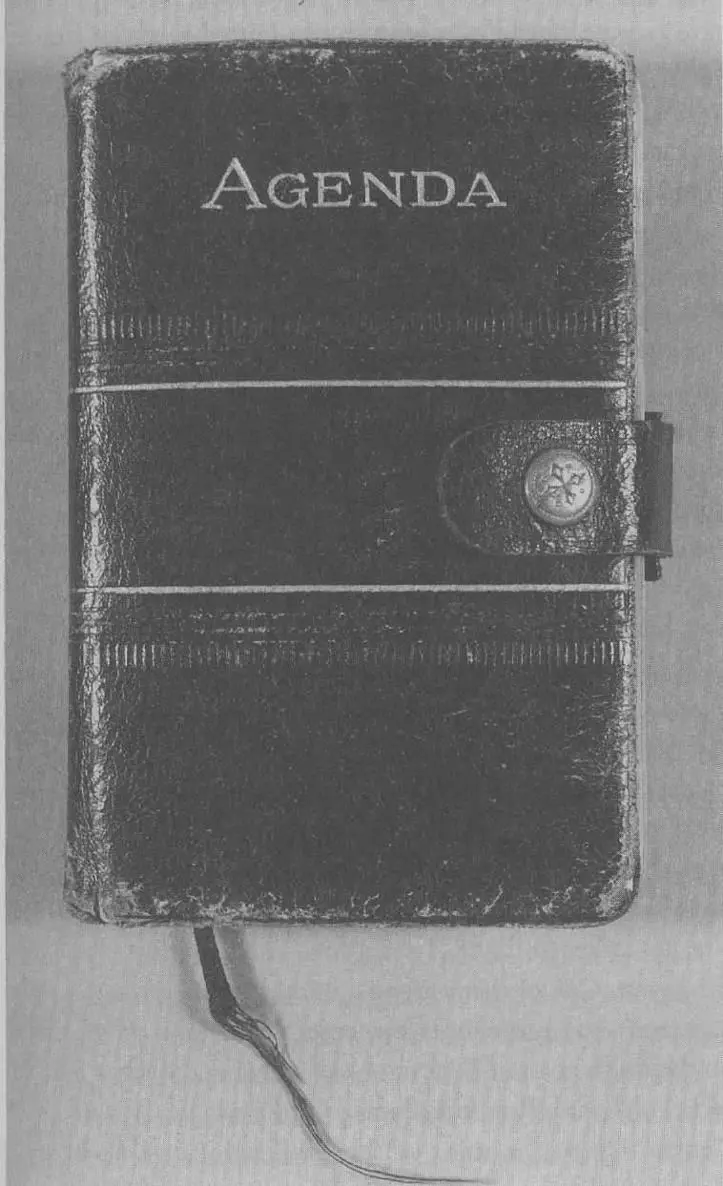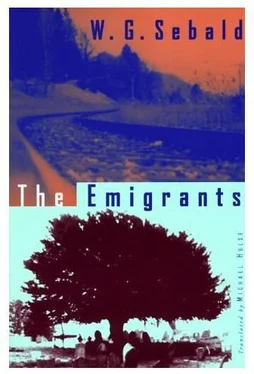On the desk in front of me is the agenda book that belonged to Ambros, which Aunt Fini gave me on my winter visit to Cedar Glen West. It is a pocket diary for the year 1913, bound in soft burgundy leather and measuring about twelve centimetres by eight. Ambros must have bought it in Milan, because that is where his entries begin, on the 20th of August: Palace H, 3 pm, Signora M. Evening, Teatro S. Martino, Corso V. Em. I tre Emisferi. Deciphering his tiny handwriting, which not infrequently moved to and fro between several

languages, was an arduous task, one I should probably never have accomplished if those words committed to paper almost eighty years before had not, as it were, opened up of their own accord. The entries gradually become more detailed, and it appears that, at the end of August, Ambros and Cosmo left from Venice for Greece and Constantinople, in a steam yacht. Early morning (it says), myself on deck for a long time, looking astern. The lights of the city receding into the distance under a veil of rain. The islands in the lagoon like shadows. Mai du pays. Le navigateur écrit son journal à la vue de la terre qui s'éloigne. The following day he writes: Off the Croatian coast. Cosmo very restless. A beautiful sky. Treeless mountains. The clouds built high. As good as dark at three in the afternoon. Bad weather. We strike our sails. Seven in the evening, the storm full force. Waves breaking on the deck. The Austrian captain has lit an oil lamp before the picture of Our Lady in his cabin. He is kneeling on the floor, praying. In Italian, strange to say, for the poor lost seamen sepolti in questo sacro mare. The stormy night is followed by a windless day. Steam up, steadily southward. I put things back in order. In the failing light ahead, pearly grey on the line of the horizon, an island. Cosmo stands fore like a pilot. Calls the name Fano to a sailor. Sfsiorsf, the sailor shouts, and, pointing ahead, he repeats, louder: Fano! Fano! Later, low on the already darkened island, I see a fire. There are fishermen on the beach. One of them waves a burning piece of wood. We pass them, and a few hours later enter the harbour of Kassiopé on the north coast of Kérkyra. Next morning the most fearful racket on board. Repairing damage to the engine. Ashore with Cosmo. Up to the ruins of the fortifications. A holm oak growing right out of the castle. We lie beneath the canopy of leaves as in an arbour. Below, they are hammering away at the boiler. A day out of time. At night we sleep on deck. The singing of crickets. Woken by a breeze on my brow. Across the straits, beyond the blue-black mountains of Albania, day is breaking, its glowing flame blazing across the lightless world. And at the same time two white ocean-going yachts trailing white smoke cross the scene, so slowly it is as if they were being pulled across a stage inch by inch. One would hardly think they were moving, but at length they are gone, into the wings of Cape Varvara with its dark green forests, over which hangs the thin sickle of the crescent moon. - 6th September: From Kérkyra via Ithaca and Patras into the Gulf of Corinth. At Itéa decided to send the boat on ahead and travel overland to Athens. Now in the hills at Delphi, the night already very cool. We lay down to sleep two hours ago, wrapped in our coats. Our saddles serve as pillows. The horses stand heads bowed beneath the laurel tree, the leaves of which rustle softly like tiny sheets of metal. Above us the Milky Way (where the Gods pass, says Cosmo), so resplendent that I can write this by its light. If I look straight up I can see the Swan and Cassiopeia. They are the same stars I saw above the Alps as a child and later above the Japanese house in its lake, above the Pacific, and out over Long Island Sound. I can scarcely believe I am the same person, and in Greece. But now and then the fragrance of juniper wafts across to us, so it is surely so.
After these nocturnal entries, the next of any length was written on the day they arrived in Constantinople. Yesterday morning left Piraeus, Ambros recorded on the 15th of September. Somewhat the worse for wear, he wrote, after the laborious overland journey. Calm voyage. Resting for hours under the awning on deck. Never seen water as blue. Truly ultramarine. This morning through the Dardanelles. Great flocks of cormorants. In the early afternoon, far ahead, the capital of the Orient appeared, like a mirage at first, then the green of trees and the colourful jostling houses gradually becoming more distinct. The masts of ships, crowding and swaying gently in a breeze, and the minarets, seeming to sway a little as well. - The Trieste captain paid, we take rooms at the Pera Palas for the time being. We enter the lobby as afternoon tea is being served. Cosmo writes in the register: Freres Solomon, New York, en route pour la Chine. Pera, the reception clerk tells me when I enquire, pera means beyond. Beyond Stamboul. Mellow orchestral music drifts through the foyer. Behind the drawn tulle curtains of the ballroom glide the shadows of dancing couples. Quand l'amour meurt, sings a woman, her voice meandering eerily. The stairs and rooms magnificent. Carpeted landscapes beneath high ceilings. Immense tubs in the bathrooms. From the balcony, a view across the Golden Horn. Evening falls. We watch the dark descending from the outlying hills upon the low roofs, rising from the depths of the city atop the lead-grey cupolas of the mosques till at length it reaches to the tips of the minarets, which gleam especially brightly one last time before the light goes. - At this point, Ambros's entries continue regardless of the dates in his diary. No one, he writes, could conceive of such a city. So many different kinds of buildings, so many different greens. The crowns of pines high aloft. Acacias, cork oaks, sycamores, eucalypts, junipers, laurels, a paradise of trees, shady slopes and groves with tumbling streams and springs. Every walk full of surprises, and indeed of alarm. The prospects change like the scenes in a play. One street lined with palatial buildings ends at a ravine. You go to a theatre and a door in the foyer opens into a copse; another time, you turn down a gloomy back street that narrows and narrows till you think you are trapped, whereupon you take one last desperate turn round a corner and find yourself suddenly gazing from a vantage point across the vastest of panoramas. You climb a bare hillside forever and find yourself once more in a shady valley, enter a house gate and are in the street, drift with the bustle in the bazaar and are suddenly amidst gravestones. For, like Death itself, the cemeteries of Constantinople are in the midst of life. For every one who departs this life, they say, a cypress is planted. In their dense branches the turtle doves nest. When night falls they stop cooing and partake of the silence of the dead. Once the silence descends, the bats come out and flit along their ways. Cosmo claims he can hear every one of their cries. - Whole districts of the city built entirely of wood. Houses of brown and grey weatherworn boards and planks, with flat-topped saddleback roofs and balconies. The Jewish quarter is built the same way. Walking through it today, we turn a corner and unexpectedly have a distant view of a blue line of mountains and the snowy summit of Olympus. For one awful heartbeat I imagine myself in Switzerland or at home again…
Have found a house out of the city, at Eyüp. It is next to the old village mosque, at the head of a square where three roads meet. In the middle of the paved square, with its pollard plane trees, the circular white marble basin of a fountain. Many people from the country pause here on their way to the city. Peasants with baskets of vegetables, charcoal burners, gypsies, tightrope walkers and bear trainers. I am surprised to see hardly a single wagon or any other vehicle. Everyone goes on
Читать дальше













